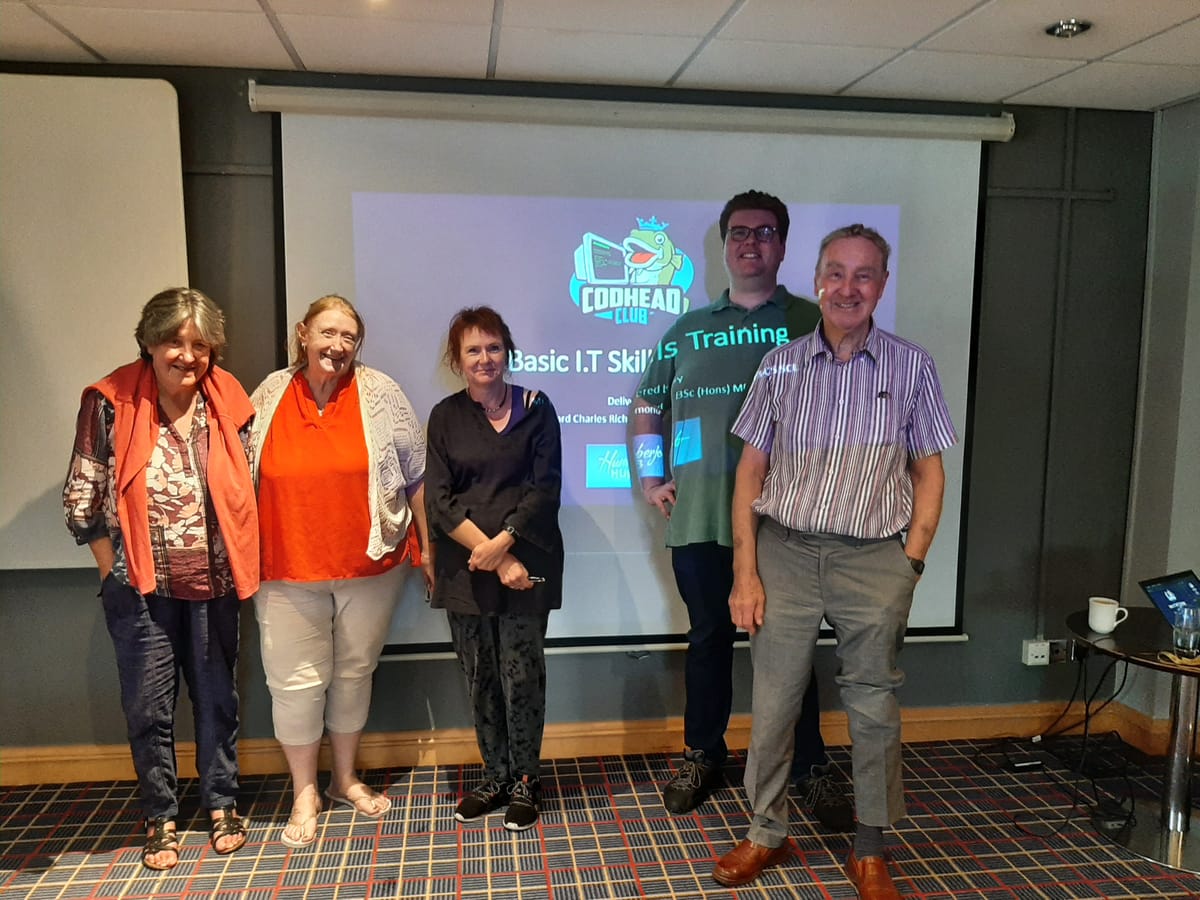What I learned from teaching an I.T Course for Over-50s
Thoughts on my experience delivering Basic I.T Classes for Over-50s.

Earlier this year, I setup a project called "The Codhead Club" and attended a networking event run by Hull CVS aimed at furthering collaboration between CVS organisations in the area. The event was called Sector Connect and proved incredibly useful in both networking aspects but also for my own introduction to the wider CVS community.
In this post, I'm going to talk about lessons I learned from teaching an I.T Course that The Codhead Club ran with an organisation I met at Sector Connect - Humber Job Hub. They help job seekers, vulnerable people and other disadvantaged groups with training and other types of support. In this case, it was an Over-50s Basic I.T Course for a range of skill sets.
I took the role of generating the course material and teaching the lessons, but other Codheaders, such as Dr. Neil Gordon, pointed to materials which would benefit the structure and material in the course.
For the stats folks, all students were over-50. They were also either seeking employment, working part-time or retired. Of the group of 8 students, the majority were female with only 1 male in attendance; all were white.
Given the above information about the students, perhaps it is appropriate to give some information about myself as well. I am 29 at the time of writing, a recent computer science graduate and as one might imagine, view the world through an almost matrixesque lens.
1. Generational Divide
Over the 5 week period we spent together, my students spent quite a bit of time recounting how they struggled to conduct their affairs because they were directed to an application or website, how hard it was to find work because employers only accepted electronic applications and how they simply didn't understand cookie pop-ups and were afraid of clicking "accept" because they didn't really know what they were accepting.
Those with more tech skills might snigger and roll their eyes. "Come on Boomer! It's 2022! Not 1902!" Yes yes. It's very easy to be lulled into a false sense of security that everyone is living in the fast lane when you're hyper-connected working in a digital industry and socializing consists of crawling the bizarreness that is Reddit; but, there is a real world and many people have not yet submitted to our technical overlords.
These are people who spent the majority of their careers working with pen and paper with no need for computers - unimaginable today, I know. Admittedly, one student was actually an electrical engineer - but there's a difference between electrical engineering and computing, even if some logic is the same - so it's not really fair to mock. I suppose it is difficult to imagine but the students did come from an era where computers didn't really matter and they don't see the significance of them today either. They've always lived without them - to the students, computers are a tool. Not an extension of themselves, not a portfolio of stock, not access to their music collection or social lives; because all of that is offline and it would be ridiculous to them for it to be otherwise.
One particular student was quite vocal about their discomfort and unease with technology, and I found it hard to disagree with their points -
"It's a form of control", they said during one of many regular contributions, "everything has to be done on the computer now and then you get emails and adverts because they track you. It's controlling! I just want to do what I needed to do and that be the end of it".
It was hard to disagree. There was speculation that Apple computers sent information "home" (back to Apple) when apps were opened. Microsoft Windows sends diagnostic and usage information "back home" so that "Microsoft can improve its products" - in previous conversations with Microsoft employees, they reassured me that the data was completely anonymous and such analytics can be turned off; however I remain skeptical. I think it would be highly beneficial commercially to know how people interact on an individual and identifiable with Windows (or any Microsoft product) and also extremely beneficial for security services to have information on potential targets usage of devices. In addition, Facebook has pixel tracking services, allowing advertisers to place a tiny dot on websites tracking people as they traverse the internet. There's something very, very sadistic about that. If a person followed you around writing down your movements, they would be arrested for stalking. It's the same principle - and the student was correct, it's a form of control.
"There are benefits to giving away some of your information" I argued back before another student chimed in "That's true! When I do my shopping online, it always shows me the stuff I've bought before and buy often. It makes it super simple". I smiled and laughed internally. Before me, I had a group of people who were only just addressing philosophical concerns I'd come to terms with nearly a decade previous.
Here is the first lesson. There is a significant generational technological skills gap in Britain. Many of our older people lack the understanding of technology in the present day to be able to use it to benefit their lives; but they are also afraid of using it for fear of losing the privacy that younger generations have long since accepted is traded away for instant gratification and convenience.
I suggest this "Generational Divide" extends the entirety of Britain with many adults over 40 lacking the core I.T & Digital skills needed to confidently maintain digital safety/security, recognize cyber threats, conduct business online and stay connected as technology advances. I also suggest that the generational divide works the opposite way too - Do today's younger generations understand paper-based processes, for example? It might be easier to fire off an email, but what happens, as might happen, if a paper-based process is required as in some cases, the court system still does require? I accept these processes are being digitized, but it is just a digital version of the paper form. What happens if there is no electric for mobile towers, it's not possible to google such things. Could younger generations conduct business as usual?
2. Reject cookies
Some lessons later we were talking about online safety and cyber security when another debate ensued. "What are all those pop-ups about then?" I was slightly blind-sided by this question given pop-ups come in multiple forms, in multiple contexts and we'd already had an admission that one home computer was still using Windows XP and my instant knowledge of pop-up generating viruses isn't fantastic. "Pop-ups?" I asked half wondering where we were going with this question, half wondering what on earth it had to do with the content at hand.
"Yeah, every time I go on the internet, it pops up asking me to accept cookies and I don't know if I should because I don't know what I'm agreeing too or who is getting my information" Oh, sweet relief. I allow myself half a second then respond that the pop-ups are part of UKGDPR, formerly GDPR when the UK was part of the EU; that the pop-ups are a legally mandated opt-in for data collection; in effect, giving visitors the choice to consent to accept cookies for various purposes, like marketing or to improve the site functionality.
I go on to explain that GDPR was supposed to resolve the issue around malicious data collection, privacy fears and give people more peace of mind and control in respect to their data. As a handy reminder, GDPR was a key piece of EU regulation which managed consent over data. It required that data/app operators, if they used cookies and processed data, ask for consent from the user to do so.
That message apparently did not get through to people who have limited technical capabilities and was not explained to older generations in a manner which they understood because I was met with blank stares and silence. After a moment or so, a student piped up "So what's the point of the pop-ups because everyone is always going to click reject". Another good point, I thought. Younger generations use ad and tracker blockers, VPNs and might even go as far as to alter the information sent by their browser or device to confuse any data collection that does happen. So really, what is the point of the pop-ups?
It was during this debate that I realized that students lack of confidence with browsing the internet came from unexpected information being presented. There was a baseline expectation that they would get to a website or request certain information and be presented with it; but instead were given pop-ups which were not understood sending them into a panic. Considering the development of apps/websites, there are perhaps better ways to implement the consent system. For example, we could assume that consent is given by default and users could be given a clear option to opt out of cookies/data collection thus negating the need for pop-ups making the experience much better for those lacking technical skills.
3. Crowd control
A couple of lessons into the course, the was a bit of disagreement about the length of debate I had let happen; some students felt that discussing topics for too long took away opportunities for physical exercises whilst others felt it was important to talk about the subjects.
"Come on Edward! Get a grip on things!" a student piped up whilst another student was mid-sentence.
As it happened, we were discussing the Online Harms Bill vs Free Expression Online. I gave the example of Harry Miller who was hounded by police for something he retweeted. The person who reported Harry Miller was someone who saw the tweet on a friends phone, so arguably not even third party - fourth or beyond. I thought it was important to have this debate because social media can be a complete shit show but it's also important to know where your rights stand in terms of expression.
After the outburst, I laughed internally. This particular student reminded me of a family member who is very straight forward and no-nonsense; but I understood there was a frustration so I brought the debate to a close and moved on. Ironically, this was the point I was making in regards to the Harry Miller story as well - that perhaps, instead of calling the police about posts online, maybe people should learn to move on - sticks and stones etc.
But that is also the 3rd lesson. There's an element of crowd control in teaching. Each person has their own expectations and wants from lessons; there will be unexpected behavior and it's up to you to manage it all. My tactics were soft power, politeness and humor.
A good example stems from one of the latter lessons where a student refused to take part in exercises. I encouraged them to take part but didn't make them feel forced or shamed into doing so. Towards the end of the lesson, there was time for 1-1 teaching and through some persuading, the student accepted help and did very well with the tasks they wanted to cover subsequently opening up to me about the reasons for their low mood, before leaving with a smile on their face and much more confidence. Job well done, I would say.
4. Teaching is hard
The nerves of speaking to a group are easily dismissed once you're familiar with the people you're teaching, Teaching is split in two - the generating of material and the delivery. Both are hard for different reasons but combined make teaching hard and I found a new admiration for teachers having done some teaching myself.
When generating lesson material, there is a need to explain complex topics in a simple yet engaging way whilst also keeping the audience in mind. In my case, I had to explain a number of topics, from social media and file types to cyber security to web browsers, to over-50s with limited I.T skills. This meant starting from scratch, keeping terminology simple (or at times leaving entire processes and terminology out) and walking through concepts carefully.
One tactic I used to overcome this was to explain network requests as conversations between computers. Instead of talking about TCP, UDP, CRUD, APIs etc - although I did cover them briefly, I created the idea that computer talk to each other to get the information they need.
For example, "Edward needs some information about cats for a project. In order to get the information he needs, his computer will talk to computers at google and ask for the information. Google's computers will look for the information Edward needs and give it to Edward's computer which will display it to Edward." The actual examples can be seen in the content I made.
The delivery presented new challenges which I partially covered in Crowd Control. I opted to present the content, but welcome interjections, debates and challenges. This turned out to be somewhat unpredictable with debates sometimes going off-topic or interjections taking up too much time. Initially, I did try menti quizzes and practicals but found that the quizzes took a lot time to complete as opposed to being a quick exercise and the practicals took a lot of time to prepare for what ended up being 30 mins or less practical time.
Overall though, I think it's the combination of the two and maintaining them for a prolonged period which is the hardest aspect. I genuinely don't know how teachers who make a career from teaching do it - but all credit to them.
Moving forward
The Codhead Club is starting 1-1 lessons with Humber Job Hub. They're expected to begin next week. We're also still pressing ahead with a variety of ambitious projects - such as software to help ease the cost of living crisis. Obviously, the more people involved the better so feel free to check out our Github and [removed]. Don't forget that Hacktoberfest returns soon and we'll be welcoming contributions to the Awesome Resources List.



